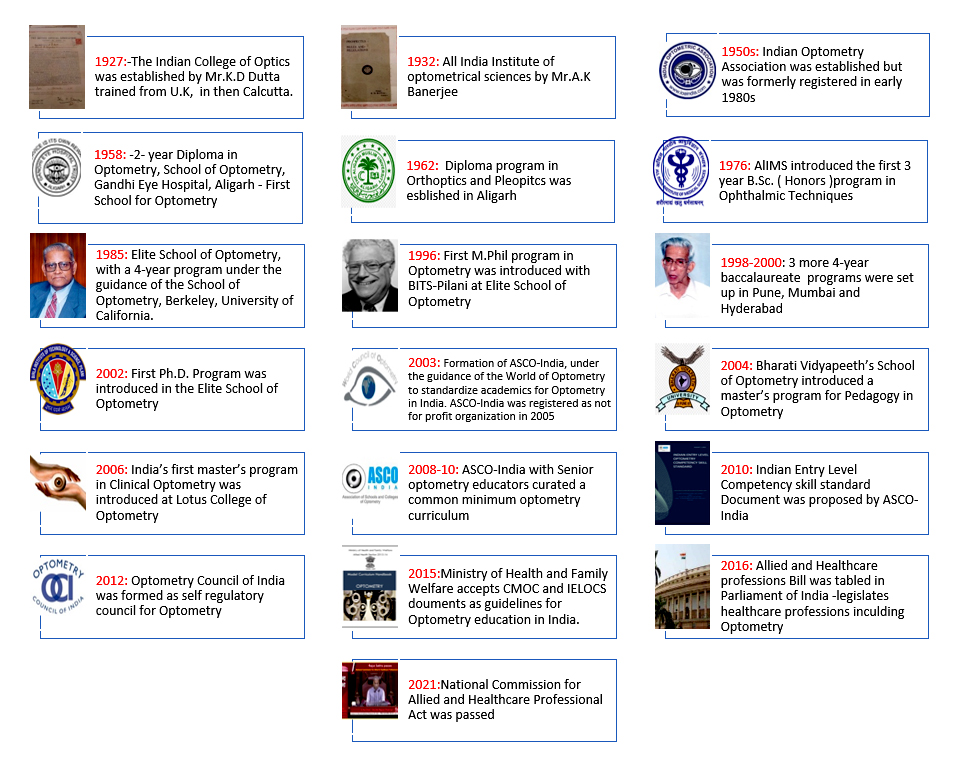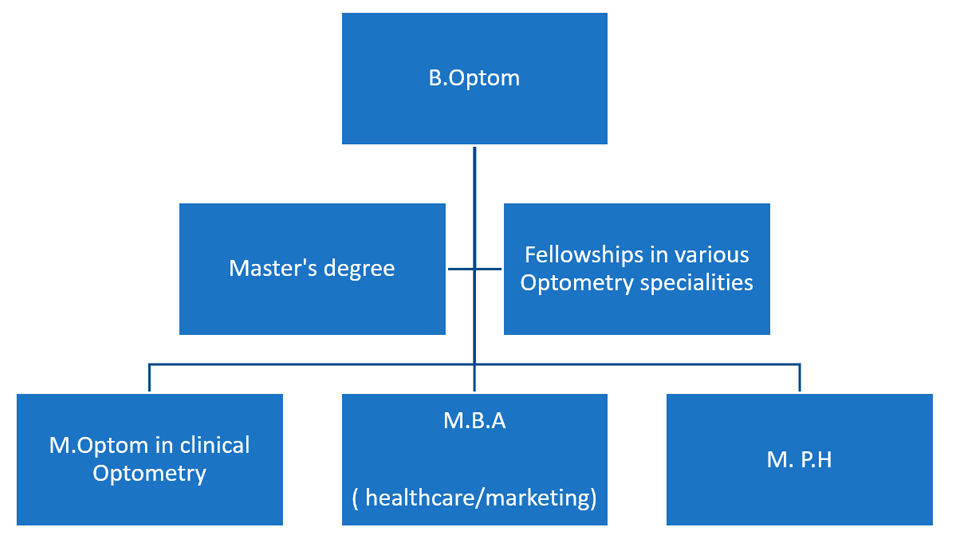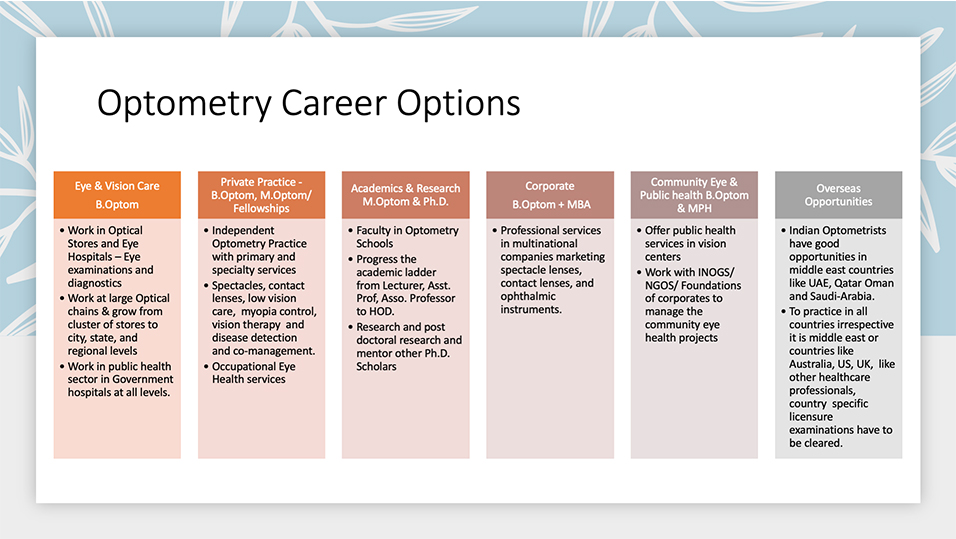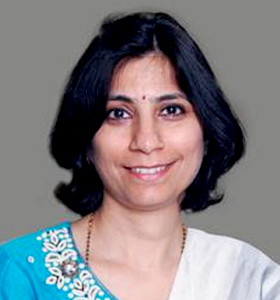Introduction
Optometry is a primary healthcare profession regulated under the National Commission for Allied and Healthcare professionals ACT 2021. The act defines an Optometrist as a “Professional who studies eye, related ailments and specializes in the management of disorders of eye and visual system, limited in scope and complexity as performed by a medical doctor having Optometrists with a minimum of four years of a baccalaureate degree”. The University Grants Commission’s nomenclature for Optometry programs is, B. Optom for a four-year undergraduate program and M.Optom for 2-year master’s program.
Optometrists in simple words are eye health physicians and Ophthalmologists are eye health surgeons.
History of Indian Optometry
Optometry in India was established under the National Program for Control of Blindness as a 2-year diploma program to assist Ophthalmologists in outpatient departments, therefore giving them more time to perform the much-needed cataract and other surgeries leading to curable and preventable blindness. The first program was established in 1958, at Gandhi Eye Hospital in Aligarh, UP.
The profession of Optometry was already established in the late 1800s, in countries like the United Kingdom and the United States. The profession grew to such an extent that ophthalmologists almost saw the professionals as encroaching into their scope of practice.2
Although Optometry was slow in its growth, the profession has certainly evolved the right way in India. Despite the exponential growth of Optometry, due to the growing needs of the population and the need for eye and vision care services, India still needs at least another estimated 100,000 optometrists as of 2023
Key Milestones in History of Indian Optometry - 1927 – 2023

How can one become an Optometrist?
Eligibility: Students who have completed their higher secondary education with Physics, Chemistry, Biology/ Mathematics (in some universities) are eligible to apply for a B.Optom program
B.Optom Program: This course includes 3 years of academics and 1 year of internship. The first academic year covers subjects of basic medical sciences like Anatomy, physiology, biochemistry, microbiology, and optics. Second academic year, optometry subjects are introduced like eye diseases, diseases, examination of the visual system, optometric optics of spectacles, etc. Optometry specialty subjects like contact lenses, binocular vision, and low vision care are covered in the third academic year. The curriculum is also well designed to cover other aspects of developing healthcare professionals like medico-legal law, practice management, and basic research.
Higher Education Opportunities in Optometry

Optometry as Healthcare profession- Scope and Future

Today India has close to 80 Optometry schools in both public and private universities across the country. It is offered with a reasonably standard curriculum across India. Optometry graduates on completion are readily absorbed by the growing ophthalmic and optical trade and industry. Graduates can work in Optical stores, performing eye examinations and dispensing spectacles and contact lenses. Those who work in eye hospitals, not only perform basic eye examinations, but also specialized diagnostics like optical coherence tomography like a CT scan of the eyes, and electro diagnostic tests. Optometrists also have corporate opportunities where they can provide professional services in companies that market contact lenses, spectacles lenses, ophthalmic instruments, etc.
Optometrists can also have good opportunities in the community eye health and public health sector. Several national and international non-governmental organizations employ optometrists to monitor their programs.
Scope in Academics and Research
With the growing numbers of Optometrists and newer programs being introduced, there is an enormous need for Optometry educators. This along with a thrust on evidence-based research has opened several opportunities for academics and research in India.
Super Specialties in Optometry
Optometrists can also set up private practices, offering several eye and vision care services. Primary eye care includes basic eye examinations and dispensing of spectacles and contact lenses. Specialty optometry services are vision therapy for the management of muscle disorders of the eyes, and low vision care services for those who are visually impaired or partially sighted. Management of conditions like myopia progression, specialty contact lenses for reshaping the eyes called orthokeratology and dry eyes management are other upcoming specialties.
Conclusion
With the NCAHP Act 2021 being implemented, Optometry has got newer wings to fly higher and reach greater heights as a strong healthcare profession in India.
References
1. Kumar N. Role of an optometrist in ophthalmic practice. Indian J Ophthalmol. 1976 Apr;24(1):41-2. PMID: 1031386.
2. Warnock S. The Optometrist’s Rise to Power in the Health Care Market, or “It’s Optometric Physician, to You”. Science Communication. 2005 Sep;27(1):100-26.
3. De Souza N, Cui Y, Looi S, Paudel P, Shinde L, Kumar K et. al. The role of optometrists in India: an integral part of an eye health team. Indian J Ophthalmol. 2012 Sep-Oct;60(5):401-5. doi: 10.4103/0301-4738.100534. PMID: 22944749; PMCID: PMC3491265.
4. Dr. R Krishnakumar, Sankara Nethralaya
Profile of Dr. Prema K Chande, B.Optom, M.Optom, DBM, FIACLE, FAAO , PhD

Optometrist graduated in 1992 from the Elite School of Optometry and completed PhD from Chitkara University in Chandigarh.
Working as Faculty and HOD of Lotus College of Optometry since year 2000 and Consultant Optometrist at Roshni Eye Care.
Principle investigator for several Community eye health projects like Sight for Kids, Mumbai Eye Care Campaign and Mumbai childhood Blindness program.
Board member of Association of Schools and Colleges of Optometry and Optometry Council of India. Represented India, on the World Council of Optometry’s Public Health Committee and Task Force member of proposed Allied Health Care Council of India, by Ministry of Family Health and Welfare. Board Member of a US based NGO called Visual Compassions.
Recipient of award as International Contact Lens Educator of Year 2016 for Asia Pacific Region, by IACLE, Australia and recipient of Excellence in Ophthalmology and Vision Award 2017, by Novartis Pharma AG. Recipient of Vocational Excellence Award by Rotary Club of Bombay Seacoast in 2018. Recipient of “Best Optometrist of the Year Award” by Sankara Netralaya’ s Elite School of Optometry, Chennai in 2018.
LSW LifeScienceWorld